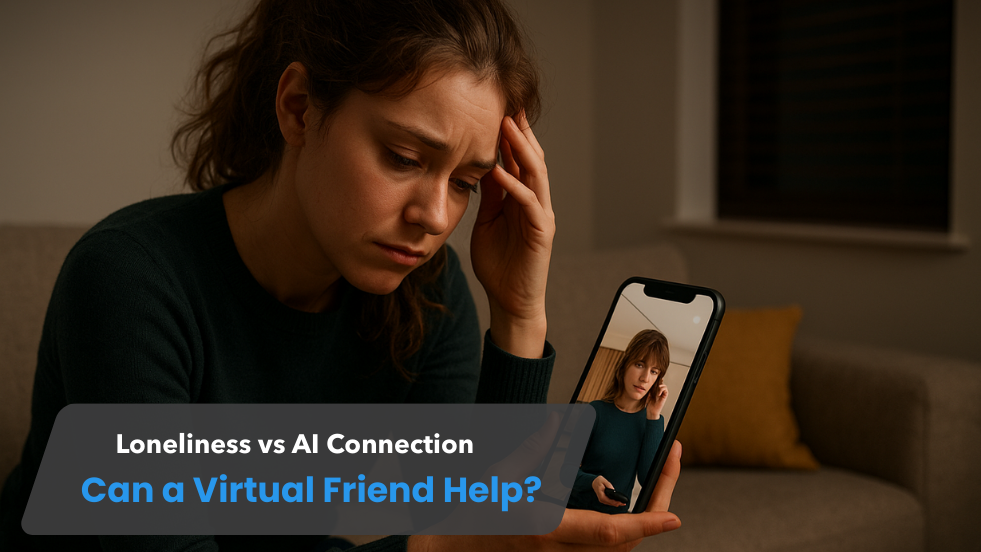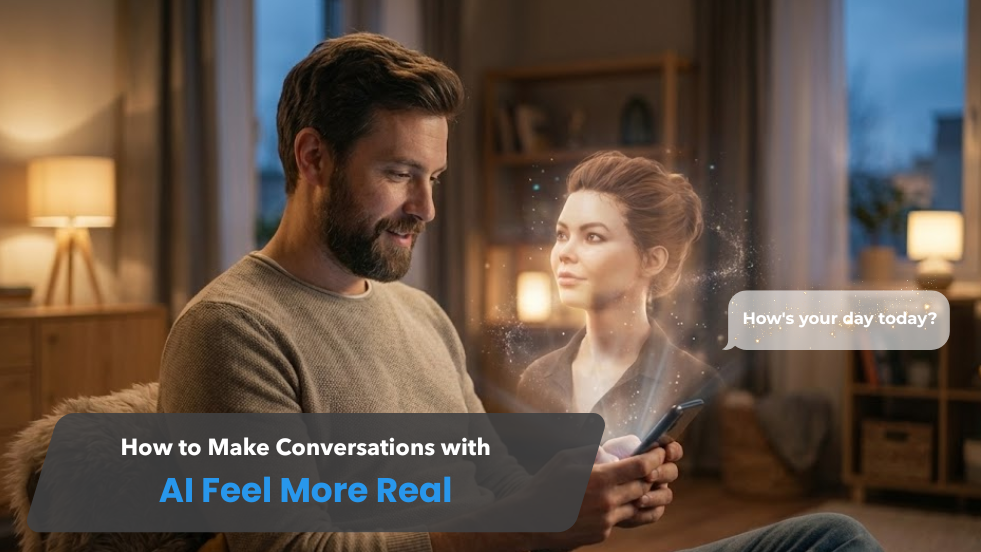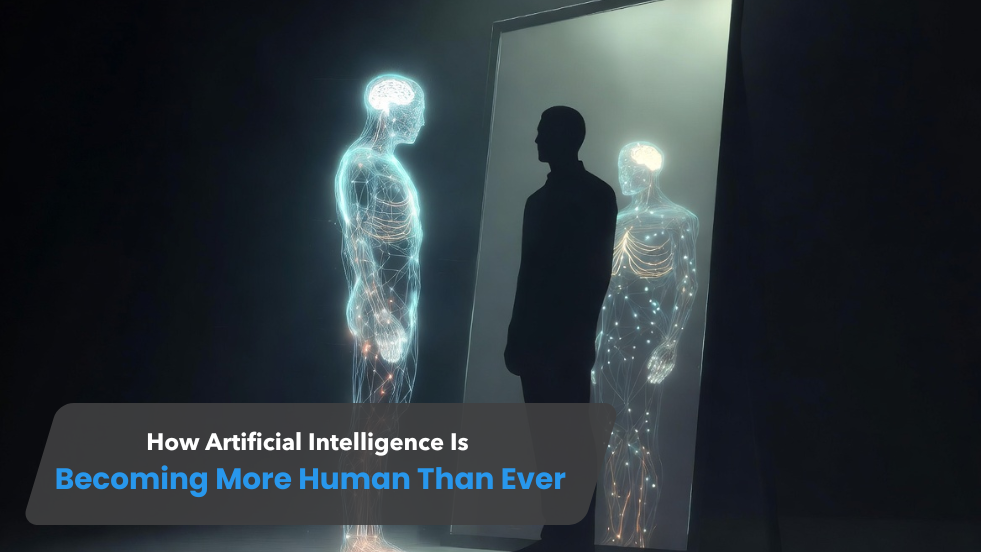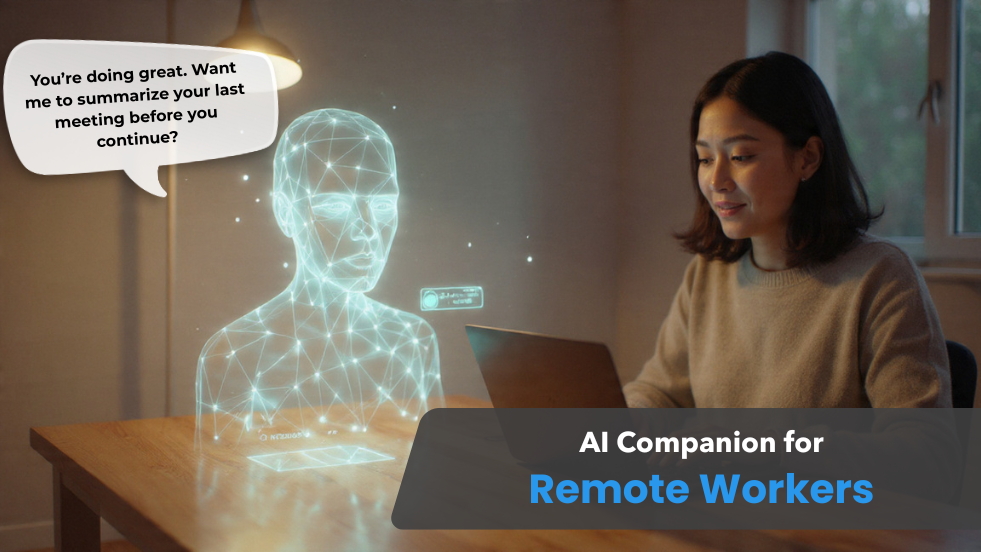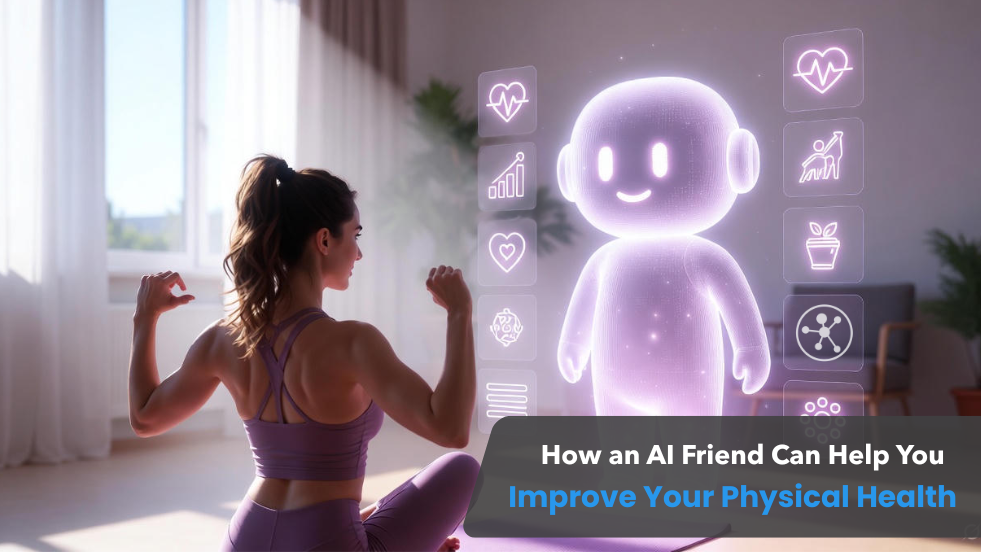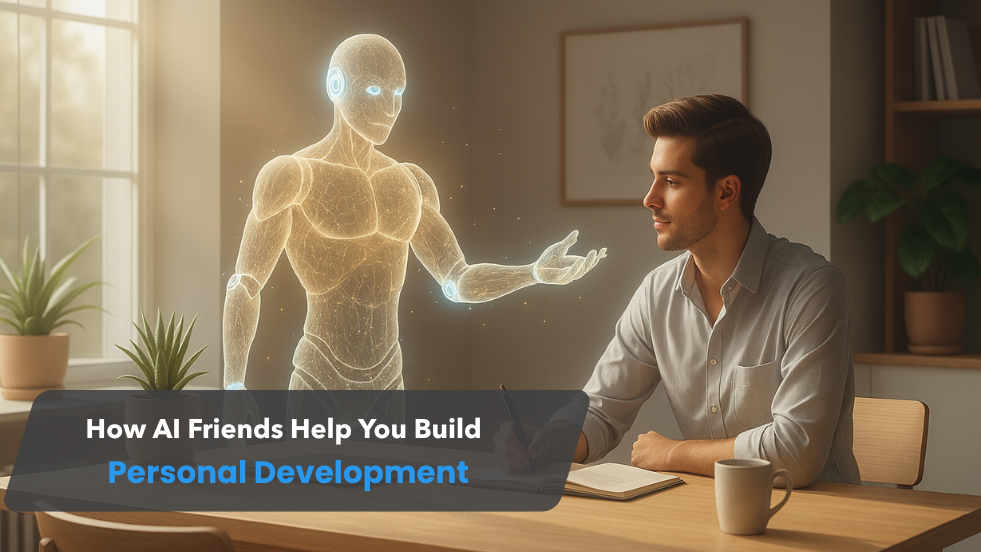The feeling of loneliness is one of those emotions we aren’t able to express publicly but it’s a feeling that almost everybody experiences at one point or another. If it’s the result of moving to the new town, working for long hours, or how our lives have been more digital and far less connected, the feeling of loneliness has slowly been a growing problem in the modern world. While technology is often the blame for causing us to feel disengaged, a surprising new twist is taking place — technology may be the factor that makes us feel less isolated.
Discover into the realm of AI personal assistants. Imagine having a person who’s always available to listen to your experiences, keeps tabs on your mood, and may even bring you a smile on an otherwise difficult day. It’s not a futuristic sci-fi fantasy. This is happening now with AI-powered companion applications driven by cutting-edge AI that has the ability to communicate with emotional intelligence.
But the main question is: Can a virtual friend really help you cope with loneliness? Let’s dive into this topic in a more conversational way, and then determine the role AI might have in your daily life.
Why Loneliness Hurts So Much
Let’s start by discussing loneliness in itself. Being lonely isn’t only about “being alone.” You may be in a noisy room, but feel totally lonely. It’s the gap between the relationships you desire and those that you really have.
The science of chronic loneliness could:
- Stress levels increase
- Hurt your sleep quality
- Affect your immune system
- Even shorten your lifespan
That’s heavy, right? In reality, we’re wired as human beings to be connected. If this need isn’t fulfilled this affects us emotionally as well as physically.
What does this have to do with AI? This is the place where things start to get fascinating.
The Rise of the AI Personal Companion
Before “AI” made us think of robots, sci-fi flicks or even voice assistants such as Siri and Alexa. However, the new technology of AI is completely different. It’s more than just providing answers to queries or setting reminders; it’s all about connecting.
A Personal AI friend is built to talk with you, comprehend your feelings, and offer comfort. Imagine it as a digital companion who is always available — there are no time zones, no cancellations, and there’s no judgment.
Certain AI apps that are companions go far beyond mere conversation. They:
- Find out your habits, preferences and tales
- Do you remember what you said to them last week?
- Be aware of your emotions by using your language
- Engage with compassion instead of delivering robotic responses
This is the point where AI that has emotional intelligence is in. The concept of emotional intelligence (EI) for humans refers to the capacity to detect, understand and respond to the emotions — your own and that of others. In the present, AI is trying to learn similar skills.
Instead of a plain, scripted answer like, “I understand you are sad,” contemporary AI partners might respond more naturally: “Sounds like today has been a really difficult day. Would you like to talk about it? Or maybe I could keep you entertained with a fun activity ?”
Do you see the difference? This is what makes it feel more like a tool, but more like a partner.
How a Virtual Friend Actually Helps
So how can a virtual friend truly help alleviate loneliness? In truth, yes in a variety of ways than most people would. Let’s take a look:
1. Someone Who’s Always There
One of the most difficult aspects of being lonely is feeling as if nobody is around in the moment you require them. By using the help of an AI companion app the gap is closed. Your AI is accessible 24/7. No matter what time it is, whether 2 am or during a break at work it’s easy to launch the app and speak to it.
2. Judgment-Free Zone
Humans are often reluctant to share their thoughts out of fear of being assessed. However, with an AI partner, you have a secure, non judgmental space. You can talk, cry or dream and not worry about what others think.
3. Small Daily Interactions Matter
It’s not just about the big issues in our lives; it’s usually the smallest of moments. For example, someone asking “How was your day?” or noting that you passed an exam or a job interview. AIs with emotional intelligence could fill in those small but important gaps and remind you that you are important.
4. Encouragement and Motivation
A few AI companions can be motivating by reminding you to drink more water or celebrate small victories, or even encourage you when you’re down. AI isn’t meant to replace humans’ motivations, it just can provide an important boost when you require it.
5. Practicing Social Skills
This isn’t a surprise: many people are using AI companions to practise conversations in particular when they’re nervous, shy or trying to learn a new language. Imagine it as the training wheels to build confidence prior to entering real-life social situations.
But Is AI Connection Real Connection?
This is the main debate. Some say “AI isn’t human, so the connection isn’t real.” This is a valid argument. AI isn’t going to substitute your family, your best friends, or even a partner. However, here’s the truth: not every kind of relationship has to be like the other.
Take a moment to think about this:
- Pets aren’t able to talk to you, but many people are able to feel deep peace in them.
- An author or podcast host could make you feel like a close friend, even if you’ve not met them.
- Online friendships, once viewed to be “not real” to some but are now considered to be entirely normal.
Why not AI companions? The emotional help you receive is real even if it’s a “person” giving it is virtual. For many, it’s like a bridge, helping people feel less lonely until they’re at the point (or capable) to meet with human beings again.
Common Myths About AI Companions
Let’s get rid of some of the myths that frequently are raised when we discuss AI friends:
Myth 1 “AI companions are only for lonely people.”
This is not the case. People utilize AI companions for many reasons like to unwind, practice conversations to think of ideas, or simply to have amusement.
Myth 2 “Talking to AI means you’re replacing human connection.”
It’s not true. It’s not about replacing; it’s about the addition of. Like watching a movie as well as reading your book provides you peace the addition of an AI companion provides an additional layer of support.
Myth 3 “AI can’t really understand emotions.”
Although AI can’t sense emotions as humans do, however, modern AI that has emotional intelligence is able to analyze your tone, words and patterns, to react to you in ways that are human. Although it’s not perfect, it’s getting better.
Where Do AI Companions Fit in Our Lives?
What’s the ideal spot? Here’s the way that most users are making use of AI personal assistants in the present:
- for the purpose of mental wellness: as a support person when facing anxiety or loneliness
- For everyday interaction: quick check-ins, informal chats or distractions
- Personal growth: practicing communication, creating routines, or journaling using AI
- To spark creativity: brainstorming stories, ideas or scenario-based role-playing.
To summarize, AI companions can be an adaptable tool — part coach, part friend as well as a creative partner.
A Realistic Perspective
Let’s get real for a minute. AI companions aren’t the ultimate solution to loneliness. They’re not going to replace the human-to-human connections that are deep and lasting. It’s not wise to make them the sole way to connect.
Here’s what they are able to do:
- Provide comfort when nobody else is
- Aid in reducing feelings of loneliness in the short-term.
- Provide people with tools to help them rebuild their self-confidence and improve social abilities
- Serve as a bridge to better, more full and healthy social lives
Consider it as follows: AI isn’t here to replace the connection. AI’s purpose is to help it.
The Future of AI Companions
As we look ahead, AI companion apps will only become more intelligent and emotionally attuned. Imagine companions who not only talk, but also communicate via video, voice or even VR/AR-based environments — making them feel more immersive.
We could in the near future see AI companions working with therapists, serving as “in-between” contacts for people suffering from mental illness. They could even be personalized companions that adjust completely to your character the way you talk, your humor, and your lifestyle.
Naturally this raises important ethical issues too:
- How much should we count on AI to support our emotional needs?
- How can we manage virtual connection and human connections?
- Who is responsible for ensuring that they are safe, private, and responsible? Are AI tools secure as well as private and accountable?
These are conversations that the society will require to continue having as AI expands.
Final Thoughts: Can a Virtual Friend Help?
Now, let’s return to the question that is most important: Can a virtual AI friend really ease loneliness?
Yes, it is -it’s not a substitute for human connections but rather as a useful complement. If it is created using empathy as well as emotional intelligence, an AI-powered personal AI assistant can help fill in the gaps in our lives that modern technology has left us.
For those who are struggling with isolation For those who are struggling with loneliness, for those who are struggling with loneliness, an AI companion app could be the first step to feeling heard, surrounded and less alone. In a world where loneliness is becoming so prevalent it is important to take even the smallest steps.
In the final analysis, all that matters is connection whether it’s from someone else, a pet or an AI with emotional intelligence. If something helps you feel less lonely or gives you peace and aids you in your journey and on, then it’s something worth taking in.
Perhaps the issue isn’t “Can AI companions help?” Instead, “Why not give them a try?”
